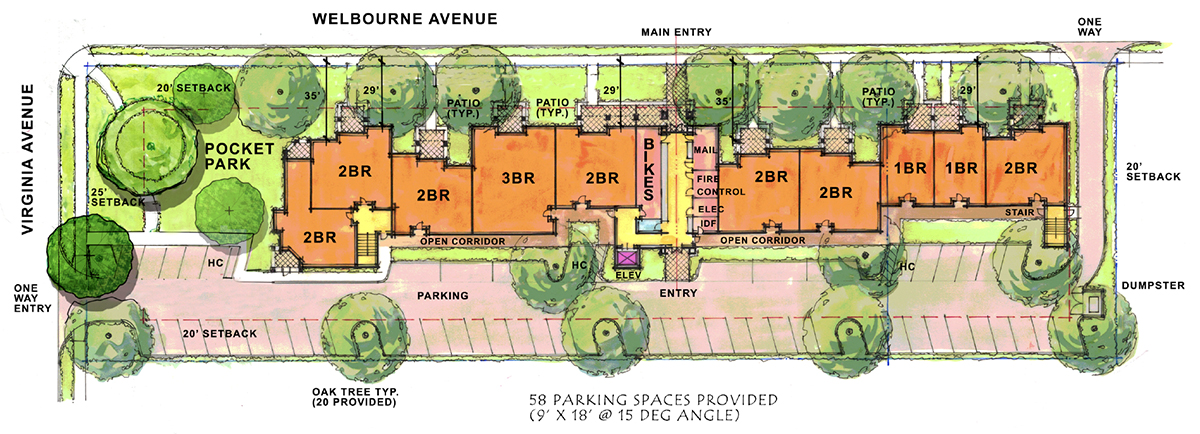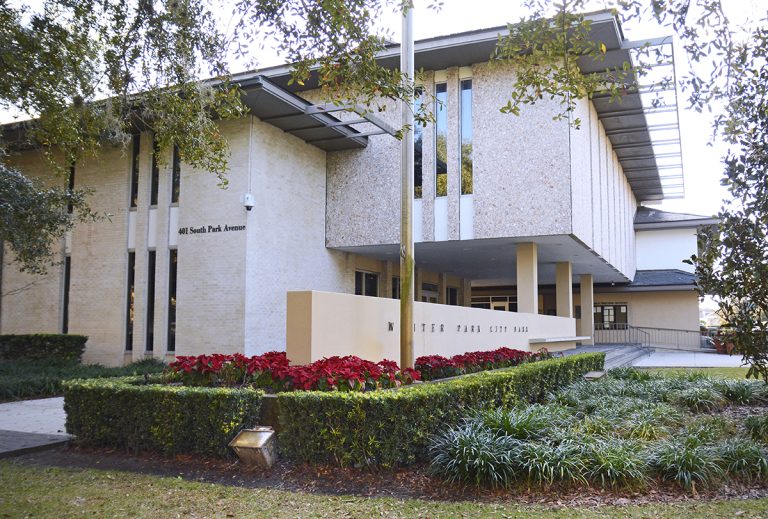The eight-month saga of the Rollins College workforce housing proposal came to an end at the August 28 City Commission meeting with a 4-1 vote in favor of conditional use approval. The plan includes a first-ever Payment in Lieu of Taxes (PILOT) agreement with the city and copies the Orange Avenue Overlay parking code.
Rollins first submitted the proposal in January with the intent of using apartments with below market value lease rates as a tool in recruiting top-level faculty and staff. Units would be available until the resident receives tenure or is promoted to a higher salary level. City and community pushback over architecture, density and parking availability, and requested zoning variances at the W. Welbourne Avenue property led to revisions that transformed the project from an 80,981-square-foot, 48-unit, flat-roof design to a 45,842-square-foot, 30-unit building with articulated rooflines and setbacks. A community benefit agreement was also attached with the following conditions:
- A five-foot easement along W. Welbourne Ave. for city-installed, on-street parking and bump-outs with trees.
- The prohibition of classroom space and of housing for undergrad and grad students.
- The property is to remain subject to ad valorem taxes unless otherwise permitted by state statutes.
- A landscape plan approved by city staff with no drainage swales along the Welbourne Avenue frontage.
- Construction plans should indicate the location of a laydown area for materials during construction.
- A six-month minimum for all leases and a requirement that only plants and patio furniture be permitted on patios and balconies.
- Roof-mounted solar panels to be part of the building design.
- Rollins to coordinate the undergrounding of powerlines with the city.
- Rollins to commit to use units exclusively as faculty and staff housing for a 30-year period.
Since the initial proposal, the city has heard from several residents opposing the property’s possible tax exemption based on Rollins’ status as a nonprofit educational entity. The Planning & Zoning Board at its August 6 meeting recommend the PILOT agreement, stating it should cover police and fire services, debt service, and stormwater service in the event a tax exemption is granted by the state.

Rollins’ attorney Becky Wilson pointed out at the August 28 meeting that stormwater fees are not part of ad valorem taxes and are paid by all tax-exempt properties. Payment equal to 2 mills, approximately 50% of the city’s portion of the ad valorem tax rate, was offered by the College but Commissioner Marty Sullivan and Vice Mayor Todd Weaver believed the number did not properly cover the cost of city services. Dissatisfaction with the idea of the PILOT agreement was expressed by Commissioner Kris Cruzada, who cited the subsidies necessary to incentivize builders to accommodate workforce and attainable housing, the challenges of a small college competing in today’s market, and what he described as a “symbiotic relationship” between Rollins College and the City of Winter Park.
“This is a representation of what we believe Rollins can be; of what Rollins does for our community,” he said. “If (the workforce housing proposal) doesn’t pass, I’d be very upset that we couldn’t help a historical partner in this city that has been with us from the very beginning.”
Rollins College President Grant Cornwell was in attendance and attempted to reiterate the intent behind the project and who the apartments are intended for. “We are not going into this to make a profit, we are going into this to allow a benefit to our faculty and staff,” he said. “These aren’t people who are going to move in and live there for 40 years and raise a family and have grandchildren.”
Conditional use approval was granted after a request by Commissioner Sullivan for Rollins to pay an amount equal to 4.3 mills – which represents the city’s full portion of the ad valorem tax rate and comes to approximately $38,000 per year – was approved by the College. A request by Mayor Sheila DeCiccio for any unoccupied apartment units to be offered to police, fire, and city staff members at Rollins’ lease rates was also approved. Vice Mayor Weaver cast the only dissenting vote on the proposal, stating he was against setting a precedent by allowing building code variances without full ad valorem participation. He was also opposed to the parking allocation.
Planning Director Emeritus Jeff Briggs explained that the property’s existing parking requirement of 2.5 spaces per unit was considered overkill as most of the apartment units are one bedroom. The adjusted allocation, recommended by city staff, utilizes the Orange Avenue Overlay parking code with 1.25 spaces for a one-bedroom unit, 2 spaces for a two-bedroom unit, and 2.5 spaces for a three-bedroom unit. “If we’ve decided that apartments on Orange Avenue can be built to this parking standard it really doesn’t make any sense why that parking standard should not apply in this location,” he said.
Briggs also said the next Planning & Zoning Board meeting would include proposed updates to city parking codes that would standardize residential parking requirements. According to the meeting agenda item, multi-family residential projects of three or more units would adhere to the Orange Avenue Overlay parking code. For townhome and condominium projects with units measuring larger than 2,000 square-feet, the city would maintain the current 2.5 spaces per dwelling unit.
The next Planning & Zoning Board meeting will be held on Tuesday, Sept. 3 at 6 p.m. City meeting schedules, agendas, and virtual access are available at cityofwinterpark.org/meetings.



